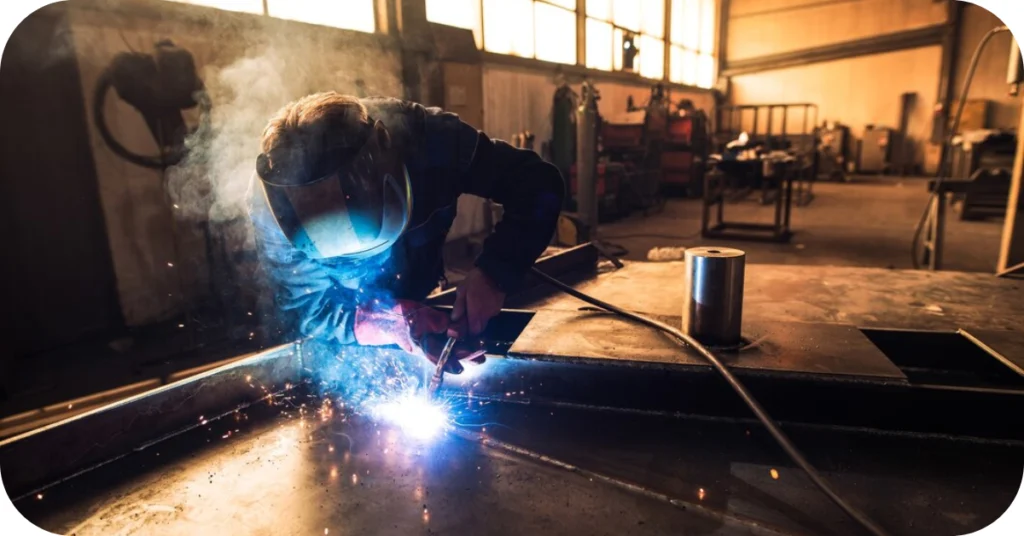The Different Types of Welding and its Uses

Welding is a fundamental process in most industries, including construction, manufacturing, automotive, aerospace, and shipbuilding. Welding is a joining process of materials, primarily metals or thermoplastics, using heat, pressure, or both. Knowledge of the process of welding and its applications is highly significant to companies that want to hire Experienced Welders for certain projects. This article presents the most common welding practices, uses, and significance in modern industries.
General Welding Overview
Welding is a construction process used to join two or more pieces of material, normally metals or thermoplastics, by heat, pressure, or both applied in order to establish a solid, permanent union. In contrast with other types of joining processes such as bolting or soldering, welding does melt the parent material and will usually add filler metal for improved strength. Shielding gases, fluxes, or even higher technologies could be used to seal out impurities and produce endurance. Welding is critical in shipbuilding, automotive, aerospace, construction, manufacturing, and infrastructure development and plays a vital part in contemporary industry.
Types of Welding Processes
1. Shielded Metal Arc Welding (SMAW)
Shielded Metal Arc Welding (SMAW), otherwise known as stick welding, is an age-old and ubiquitous welding process. Shielded Metal Arc Welding utilizes a flux-coated consumable electrode that is melted to form the weld. The flux coating produces a shielding gas that preserves the weld from atmospheric contamination. Shielded Metal Arc Welding is a low-cost, versatile process and is suitable for outdoor and structural welding applications.
Applications:
Construction: For structural steel building and bridge construction.
Pipeline Welding: Critical in oil and gas industries.
Shipbuilding: Employed for heavy metal building.
Repair and Maintenance: Applicable to out-of-shop repair because it is portable and flexible.
2. Gas Metal Arc Welding (GMAW/MIG)
Gas Metal Arc Welding (GMAW), or MIG welding, employs a continuous solid wire electrode that is supplied by a welding gun. A shielding gas, usually argon or an argon-carbon dioxide mixture, protects the weld pool from oxidation. With a high deposition rate and low skill level, producing clean welds, it has widespread use in automotive, fabrication, and industrial sectors.
Applications:
Automotive Industry: Used in the assembly of the car body parts and chassis.
Manufacturing: Most suitable for high-speed production due to its efficiency.
Fabrication: Most suitable for welding aluminum and non-ferrous metals.
Home Projects: Usually employed in home projects and light-duty fabrication projects.
Also Read: Metal Fabrication Basics: What You Need to Know
3. Gas Tungsten Arc Welding (GTAW/TIG)
Gas Tungsten Arc Welding (GTAW), also known as TIG welding, utilizes a non-consumable tungsten electrode and shield gas (usually argon or helium) to form high-quality welds. It is extremely accurate, possesses an exceptionally clean finish, and is capable of welding thin metals such as stainless steel, aluminum, and titanium. GTAW is most frequently applied in aerospace, automotive, and creative metal construction.
Applications:
Aerospace Industry: Used to weld thin and high-strength materials.
Automotive and Motorsport: Used to weld stainless steel and aluminum components.
Art and Sculpture: Best used in artistic metal sculptures owing to precision.
Food and Beverage Industry: Offers sanitary food-grade welding on stainless steel.
4. Flux-Cored Arc Welding (FCAW)
Flux-Cored Arc Welding (FCAW) is a near relative of MIG welding that uses a hollow, tubular wire with flux inside that eliminates the need for external shielding gas in some uses. It is most ideal for outdoor welding, heavy construction, and structural fabrication due to its high deposition rate and ability to weld thick metals fast.
Applications:
Heavy Equipment Fabrication: Used for welding of heavy metals.
Ship construction: Best suitable for outdoor application in windy situations.
Construction of structural steels: Produces deep weld penetration and higher strength.
Repair and Overhaul: Applied for field welding in adverse environment conditions.
5. Electron Beam Welding (EBW)
Electron Beam Welding (EBW) is a highly precise welding process involving a focused beam of high-velocity electrons that generates heat and fuses materials inside a vacuum chamber. It offers deep penetration, low distortion, and high-quality welds, which qualify it for aerospace, automotive, and high-technology manufacturing industries.
Applications:
Aerospace and Defense: Applied for high-precision welding of mission-critical parts.
Medical Device Manufacturing: Used for welding stainless steel and titanium implants.
Nuclear Industry: Delivers welds free from defects in nuclear reactor components.
Automotive Industry: Used in manufacturing fuel injector and transmission components.
6. Laser Beam Welding (LBW)
Laser Beam Welding (LBW) uses a concentrated laser beam to melt and weld materials with high precision and minimal heat distortion. It is widely used in the automotive, medical device manufacturing, and microelectronics sectors for its ability to weld thin materials and form complex joints at high speed and precision.
Applications:
Automotive Industry: Employed in automatic welding processes where high speed is employed.
Electronic Sector: Used for welding intricate and small items.
Jewelry Industry: Used for accurate welding of precious metals.
Aerospace Industry: Employed for light high strength applications.
7. Resistance Spot Welding (RSW)
Resistance Spot Welding (RSW) spot welds thin metal sheets by pressing and high electrical current at the areas of interest, generating localized heat to form the weld. It is used in automobile, electronics, and appliance manufacturing due to its speed, repeatability, and economy.
Applications:
Automotive Industry: Assembly of car bodies and panels.
Appliance Assembly: Critical in refrigerator and washing machine assembly.
Aerospace Industry: Used in aircraft structural assembly.
Sheet Metal Forming: Used in the production of enclosures and cabinets.
Why TRG Technical Service?
We at TRG Technical Service are the specialists in getting the best-caliber welding specialists with the capability to manage different welding applications on behalf of various industries. With technical staffing talent, businesses within and beyond the UAE benefit from being offered access to the best-caliber welding specialists. Regardless of your requirements for skilled welders for the construction sector, automobiles, aerospace sector, or heavy machinery manufacturing, TRG Technical Service is your staffing solution partner to call.
Click here to find out more about our recruitment services.


